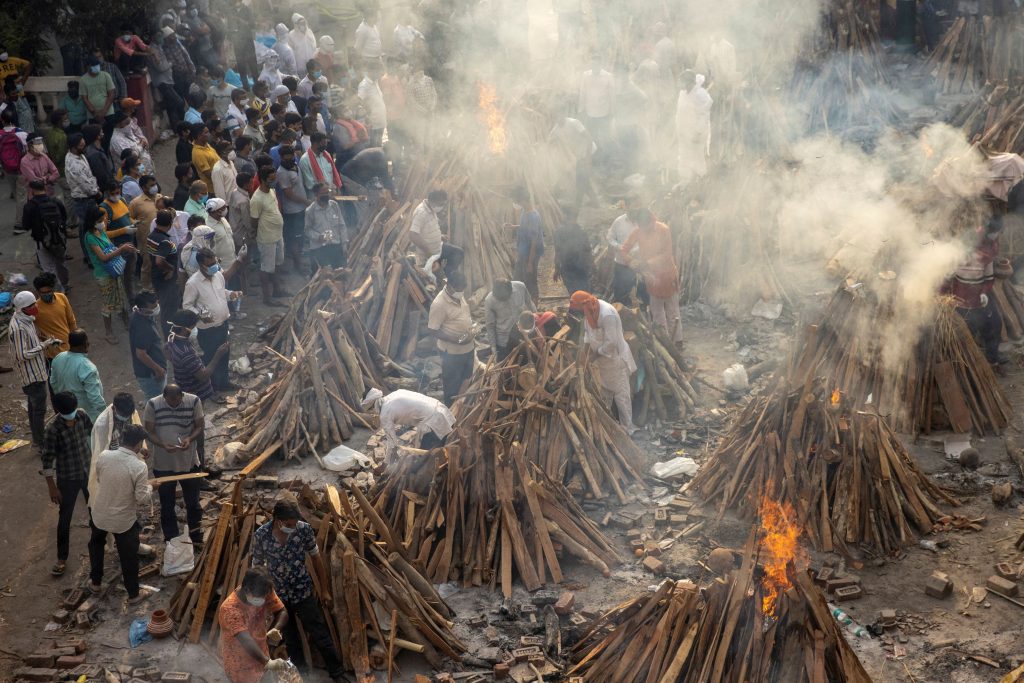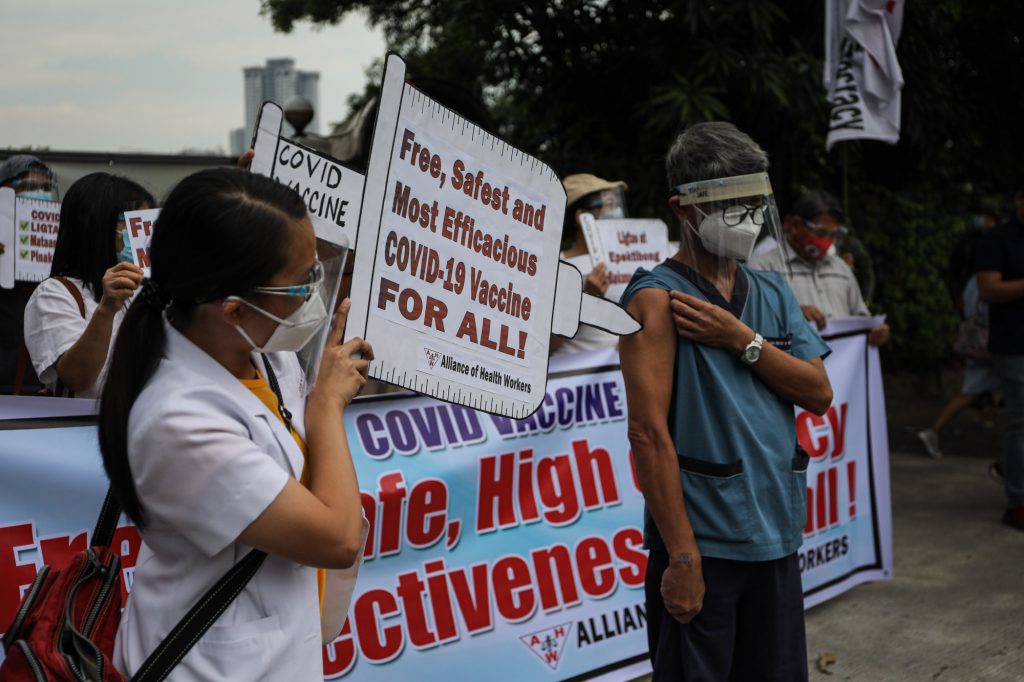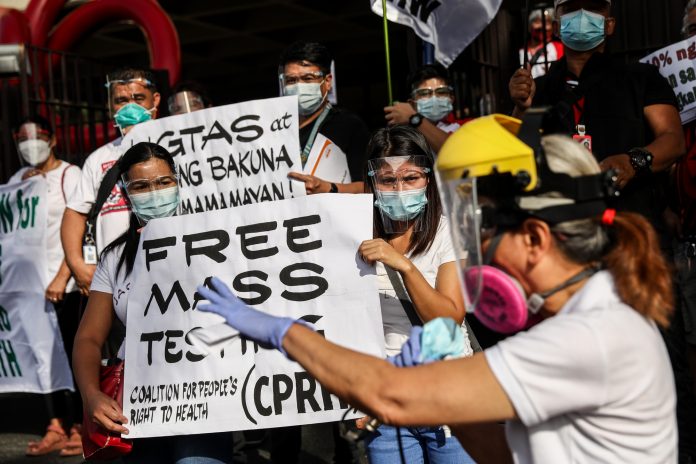After one year, one month and 15 days, or roughly 411 days, Rodrigo Duterte’s administration remains indifferent and largely third-rate in its pandemic response.
Fawning over China for its “vaccine donations”—a largely debatable subject, if I may add—only makes matters more problematic when viewed from the lens of national sovereignty.
The country is slowly being peddled piecemeal even as the pandemic restricts us into our homes, this being Duterte’s idea of showing gratitude to the Communist-Capitalist superpower. I fear it has come to the point where Beijing can now boss the Philippine government around like it owns it. One clear indication is China’s insistence that we stop all military exercises in the West Philippine Sea. Question is: what other demands are they not telling us?
The unfolding catastrophe Filipinos are facing, nay the world is facing, is nothing to scoff at. With the way the government’s vaccination program is limping, based on the Philippine Vaccine Tracker, the country will have reached herd immunity sometime Dec. 2029 or 8.6 years from now.
Those fully vaccinated had only reached 0.22% as of this writing, with those getting their first jab at 1.41%. We are a nation of 110.6 million people. Microscopic doesn’t even begin to describe government’s vaccination efforts. It’s almost pathetic, had it not been for people actually queuing for their first and second jabs.
Duterte’s track-record of making a dog’s dinner of his promises puts his pledged 70% immunization of the population by year’s end in the gutter.
Duterte’s spin doctors quickly devised a plan to stave off further criticism of the government’s botched pandemic response. First stop: build a comparison between the Philippines and other countries—one particular country being India—to clean up the tears and smears in our own race towards herd immunity.
One serious glitch in the attempt is that it relegates human lives as mere numbers. When COVID-19 patients are dismissed as mere statistical figures and percentages in the effort to polish the reputation of government, or whatever’s left of it, you know this government couldn’t care less if you choke and die in front of the very door of power. You’ve become to them a liability, not a responsibility.
As for India, it is suffering like the rest of the world. The recent comparison is hardly any proof that the Philippines is doing better. Looking at it closer, India’s situation is more of a warning that if we let mediocrity and incompetence continue to define our COVID-19 response, we will end up in a far worse situation than India could ever have imagined.
In an article in The Guardian, novelist Arundhati Roy describes the tragedy of having Narendra Modi as Prime Minister of her beloved India at a time of crisis: “It’s hard to convey the full depth and range of the trauma, the chaos and the indignity that people are being subjected to. Meanwhile, Modi and his allies are telling us not to complain.”
Sounds awfully familiar, doesn’t it? Chaos, indignity and being stripped of the right to air our grievances are just some of the things people suffer from—including the pandemic.
Roy adds, “Modi the magician takes a bow for saving humanity by containing the coronavirus effectively. Now that it turns out that he has not contained it, can we complain about being viewed as though we are radioactive? That other countries’ borders are being closed to us and flights are being cancelled? That we’re being sealed in with our virus and our prime minister, along with all the sickness, the anti-science, the hatred and the idiocy that he, his party and its brand of politics represent?”

People want to polish their reputations by comparing the Philippines with India? Compare this: India is being choked to death not just by the pandemic but by leaders who are no different from our own here in the Philippines: dead-set on spreading chaos, lies, hatred, the anti-science and antipoor sentiments, and venal brand of politics.
In fact, a plea from an Indian national did the rounds of Facebook, which spin doctors should do well to heed:
“Please stop using our country, India, as your dirty linen. To abuse our misery, that you are much better off; an excuse to give yourselves a pat on the back for doing what you would call as an excellent job is immoral… It is apathetic, insensitive. What we expect are sympathies and prayers, especially coming from a country that boasts itself as a Christian nation.
“Also, citing India as a comparison against your country is statistically faulty, as India has over a billion population and India’s states, provinces and cities, geographically are interconnected by land while PH has the luxury of distances, provinces divided by waters.
If you want to challenge yourselves and establish a reasonable benchmark, choose your own size.”
As far as I’m concerned, I join the esteemed novelist in struggling to articulate the “full depth and range of the trauma, the chaos and the indignity” that Indians and Filipinos are being subjected to. Meanwhile, Duterte and his allies “are telling us not to complain.”
Busy as Duterte can ever be by polishing his already tarnished reputation by filing a memo, saying “Pursuant to the directive of the President [emphasis, mine] and by the authority of the Secretary, all government media platforms are hereby directed to carry regular updates about the world data on COVID-19, specifically to convey to the public that the Philippines is faring better than many other countries in addressing the pandemic,” this government is apparently nowhere near to addressing the pandemic than when it first wreaked havoc on our shores in early 2020.
And why is this so? Because some have reason to believe that the figures being reported don’t match what is happening on the ground. Rumors of cover-ups, mismatches, as well as contradicting claims, abound.
Journalists covering the COVID-19 beat have little to go on as regards other sources of information save for the health department, whose track-record in dealing with the pandemic has been subject to question and criticism from Day One.

Where the billions of dollars in loans and donations were spent only muddled what is already a jumbled mix of claims and counterclaims. Very little has been said about this in Duterte’s Monday press conferences.
As for comparing ourselves with other countries, there’s a world of difference between a government failing after it had exhausted all ways and means to fix the problem, and government failing because it prioritized dolomite beaches, engaged in internal vaccine politics while sitting on their behinds.
Likewise, using only statistical figures for comparison doesn’t do justice to the deeper realities which include socioeconomic, political, geographical, emotional, and even psychological and personal factors.
We cannot let the words and claims of Duterte and his minions become our prison. Breaking the chains of false narratives and false dichotomies is the duty of every freedom-loving Filipino.
The work is practically cut out for us, what with the President’s Monday press conferences that limit the discussion of the problem to simplistic and largely one-dimensional thinking, such as his affection for Chinese Pres. Xi Jinping and their imagined successes.
It helps that many are beginning to see some light at the end of this long and tedious tunnel. The Community Pantries-Pilipinas movement has shown what Filipinos can achieve all by themselves at a time of severe crisis. The movement is not simply about feeding the poor, the abandoned, the “disposables” as Duterte’s government seems to define them. The community pantries movement is undeniable proof that Filipinos, come hell or government incompetence, would resort immediately to kindness, and a level of solidarity that forces the powers that be to cringe on their seats.
We’ve sat on the edge of our seats for far too long. The community pantries may just be the start of something big, something we should’ve done at the onset of Duterte’s term. But it’s never too late.
We can reflect what we’ve learned from community pantries by standing in solidarity with other nations like India, and tell the world we will not go down without a fight.
Joel Pablo Salud is an editor, journalist and the author of several books of fiction and political nonfiction. He is currently the chair of the Philippine Center of International PEN’s Writers in Prison Committee. The views and opinions expressed in this article are those of the author and do not necessarily reflect the official editorial position of LiCAS.news.









